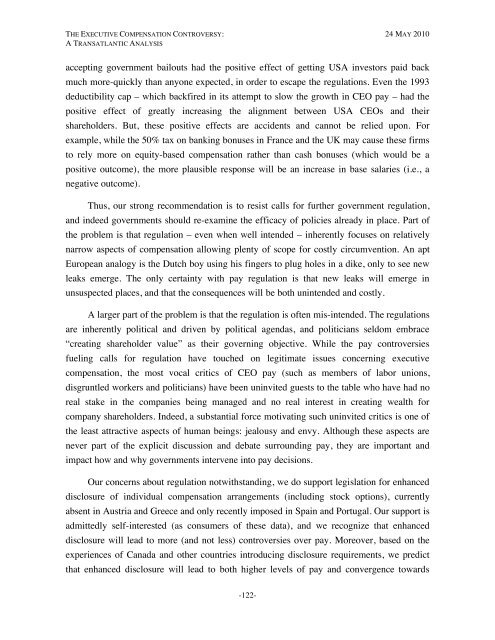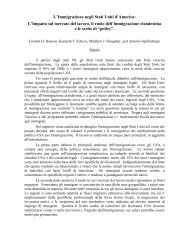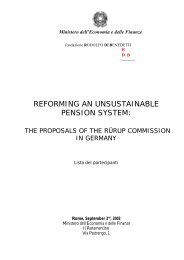The Executive Compensation Controversy - Fondazione Rodolfo ...
The Executive Compensation Controversy - Fondazione Rodolfo ...
The Executive Compensation Controversy - Fondazione Rodolfo ...
Create successful ePaper yourself
Turn your PDF publications into a flip-book with our unique Google optimized e-Paper software.
THE EXECUTIVE COMPENSATION CONTROVERSY: 24 MAY 2010A TRANSATLANTIC ANALYSISaccepting government bailouts had the positive effect of getting USA investors paid backmuch more-quickly than anyone expected, in order to escape the regulations. Even the 1993deductibility cap – which backfired in its attempt to slow the growth in CEO pay – had thepositive effect of greatly increasing the alignment between USA CEOs and theirshareholders. But, these positive effects are accidents and cannot be relied upon. Forexample, while the 50% tax on banking bonuses in France and the UK may cause these firmsto rely more on equity-based compensation rather than cash bonuses (which would be apositive outcome), the more plausible response will be an increase in base salaries (i.e., anegative outcome).Thus, our strong recommendation is to resist calls for further government regulation,and indeed governments should re-examine the efficacy of policies already in place. Part ofthe problem is that regulation – even when well intended – inherently focuses on relativelynarrow aspects of compensation allowing plenty of scope for costly circumvention. An aptEuropean analogy is the Dutch boy using his fingers to plug holes in a dike, only to see newleaks emerge. <strong>The</strong> only certainty with pay regulation is that new leaks will emerge inunsuspected places, and that the consequences will be both unintended and costly.A larger part of the problem is that the regulation is often mis-intended. <strong>The</strong> regulationsare inherently political and driven by political agendas, and politicians seldom embrace“creating shareholder value” as their governing objective. While the pay controversiesfueling calls for regulation have touched on legitimate issues concerning executivecompensation, the most vocal critics of CEO pay (such as members of labor unions,disgruntled workers and politicians) have been uninvited guests to the table who have had noreal stake in the companies being managed and no real interest in creating wealth forcompany shareholders. Indeed, a substantial force motivating such uninvited critics is one ofthe least attractive aspects of human beings: jealousy and envy. Although these aspects arenever part of the explicit discussion and debate surrounding pay, they are important andimpact how and why governments intervene into pay decisions.Our concerns about regulation notwithstanding, we do support legislation for enhanceddisclosure of individual compensation arrangements (including stock options), currentlyabsent in Austria and Greece and only recently imposed in Spain and Portugal. Our support isadmittedly self-interested (as consumers of these data), and we recognize that enhanceddisclosure will lead to more (and not less) controversies over pay. Moreover, based on theexperiences of Canada and other countries introducing disclosure requirements, we predictthat enhanced disclosure will lead to both higher levels of pay and convergence towards-122-









